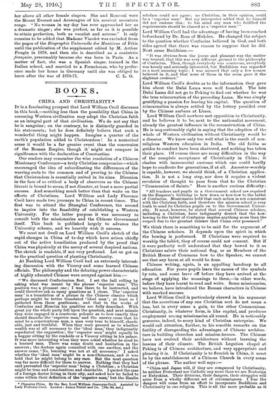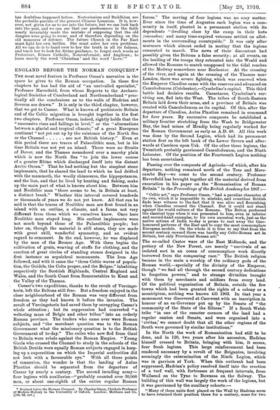BOOKS.
CHINA AND CHRISTIANITY.* IT is a fascinating prospect that Lord William Cecil discusses in this book,—nothing less than the possibility that China in assuming Western civilisation may adopt the Christian faith as an integral part of that civilisation. We do not say that he is sanguine ; on the contrary, he is distinctly guarded in his statements ; but he does definitely believe that such a wonderful thing might happen. Imagine a quarter of the earth's population added to Christendom ! In a numerical sense it would be a far greater event than the conversion of the Roman Empire, though it' might not compare in significance with the declaration of Constantine.
Our readers may remember the wise resolution of a Chinese Missionary Conference—a truly Christian compromise—which encouraged the idea of subordinating the differences of the warring sects to the common end of proving to the Chinese that Christendom is essentially united in its aims. Disunion in the face of so critical a body of observers as the Chinese literati is bound to mean, if not disaster, at least a mere partial success. And something much better than that waits on the efforts of Christians. Lord William and Lady Florence Cecil have made two journeys to China in recent times. The first was to attend the Shanghai Conference, the second to inquire into the feasibility of establishing a Western University. For the latter purpose it was necessary to consult both the missionaries and the Chinese Government itself. This book is published largely to advance the University scheme, and we heartily wish it success.
We must not dwell on Lord William Cecil's sketch of the rapid changes in China of to-day which have arisen chiefly
out of the active humiliation produced by the proof that China was physically at the mercy of several despised nations.
The sketch is readable, if not very profound. Let us get on to the practical question of planting Christianity.
At Nanking Lord William Cecil had an extremely interest- ing discussion with the Viceroy and some learned Chinese officials. The philosophy and the debating power characteristic of highly educated Chinese were arrayed against him:—
" We discussed Confucianism first. I set the ball rolling by asking what was meant by the phrase superior man.' The position was a pleasant one ; I was there to be instructed, and could therefore ask as many questions as I chose. The superior man' is a translation of a phrase in the Chinese classics which perhaps might be better translated 'ideal man ' ; at least so I gathered from these gentlemen ; and that in the works of Confucius and Menchis his qualities are fully described. With great joy the whole party fell upon the question, and next minute they were engaged in a courteous polemic as to how exactly they should describe the 'superior man,' and the answer came that he must be a conscientious man, a man very true to himself, charit- able just and truthful. When they were pressed as to whether wealth was at all necessary to the 'ideal man,' they indignantly repudiated the suggestion ; the superior man' might equally be a beggar sitting by:the roadside or a Viceroy sitting in his palace. It was more interesting when they were asked whether he need be a learned man. There was some doubt and hesitation in the answers ; the doctors again consulted with one another, and the answer came, No, learning was not at all necessary: I asked whether the ' ideal man' might be a non-Chinaman, and it was held that he might won to any ram But the next question was far more difficult for them to answer. Nothing that they had said prevented the 'superior man' being a Christian ; a Christian might be trae and conscientious and charitable. I quoted the case of a foreign doctor living in their city, and asked how he failed to come within their definition of the `aaperior man,' but the Harlin • Changing China. By the Rev. Lord William GEmovie-Cecil. Assisted by Lady Florence Cecil. London : James Nisbet and Co. [10s. 6d. net.]
scholars could not agree ; no Christian, in their opinion, could be a superior man.' But my interpreter added that he himself did not endorse this ; to his mind any man who fulfilled the requirements should be classed as a 'superior man. "
Lord William Cecil had the advantage of having been coached beforehand by Dr. Ross of Mukden. He changed the subject to the question whether Confucius believed in God, and both sides agreed that there was reason to suppose that he did. Next came Buddhism:— "It was obvious from the jocose and pleasant way the matter was treated, that this was very different ground to the philosophy of Confucius. Then, though everybody was courteous, everybody was keenly and seriously interested, but Buddhism was regarded as a most amusing topic ; I was assured that only a few women believed in it, and that none of those in the room gave it the slightest credence."
Lord William Cecil's doubts as to the information they gave him about the Dalai Lama were well founded. The late Dalai Lama did not go to Peking to find out whether he was the true reincarnation of the preceding Lama. He was simply gratifying a passion for leaving his capital. The question of reincarnation is always settled by the lottery presided over by the Chinese ambans at Lhasa.
Lord William Cecil nowhere met opposition to Christianity, and he believes it to be, next to the nationalist movement, already the greatest influence in the reconstruction of China.
He is unquestionably right in saying that the adoption of the whole of Western civilisation without Christianity would be a disaster. We know only too well what is the result of non- religious Western education in India. The old faiths as guides to conduct have been shattered, and nothing has taken their place. Of course there are many difficulties in the way of the complete acceptance of Christianity in China; it clashes with immemorial customs which one could hardly
hope to eradicate for generations, if at all. Ancestor-worship is capable, however, we should think, of a Christian applica- tion. It is not a long step, nor does it require a violent revulsion of thought to pass from that to the Christian "Communion of Saints." Here is another curious difficulty: "All teachers and pupils in a Government school are required on the Emperor's birthday to bow down or kow-tow to the tablet of Confucius. Missionaries hold that such action is not consistent with the Christian faith, and therefore the mission school is very loath to send its Christian pupils on to the Government Univer- sity. It must, however, be stated that several Chinese scholars, including a Christian have indignantly denied that the kow- towing to the tablet ("Confueius implies anything more than the respect due to the greatest thinker that China ever posseesed."
We think there is something to be said for the argument of the Chinese scholars. It depends upon the spirit in which the bowing is performed. If Christians were required to worship the tablet, they of course could not consent. But if it were perfectly well understood that they bowed to it as Christians salute their national flag, or as Members of the British House of Commons bow to the Speaker, we cannot see that any harm at all would be done.
Chinese writing, again, is an appalling handicap to all education. For years pupils learn the names of the symbols by rote, and some leave off before they have arrived at the stage of applying the meanings to them,—in other words, before they have learnt to read and write. Some missionaries, we believe, have introduced the Roman characters in Chinese with marked success.
Lord William Cecil is particularly shrewd in his argument that the accretions of any one Christian sect do not mean a loss, but in every sense a gain, to the other Communions.
Christianity, in whatever form, is like capital, and produces employment among missionaries all round. He is noticeably generous, indeed, to every kind of Christian enterprise. We would call attention, further, to his sensible remarks on the futility of disregarding the advantages of Chinese architec- ture in building churches and mission-houses. The Chinese have not evolved their architecture without learning the lessons of their climate. The British Legation chapel at Peking is of Chinese architecture, and very appropriate and pleasing it is. If Christianity is to flourish in China, it must be by the establishment of a Chinese Church in every sense of the phrase. The author well says
"China and Japan will, if they are conquered by Christianity, be neither Protestant nor Catholic any more than we are Nestorian or Eutychian. Their divisions, their dangers, their struggles will arise from a wholly different set of circumptancee. I fear the dangers will come from an effort to incorporate Buddhism and Christianity in one religion. This is all the more probable as it
has doubtless happened before. Nestorianism and Buddhism are the probable parents of the present Chinese Lamaism. It is, how- ever, not given for us to see into the future, but we can look back into the past, and we can see that our predecessors in the faith nearly invariably made the mistake of supposing that the old dangers were going to recur, and of therefore depending on the old measures of defence. The future Church in the Far East must fight her own battles. She must solve her own problems. All we can do is to hand over to her the truth in all its fulness, and teach her to look for divine guidance, to forget such words as Protestant, Roman Catholic, Nonconformist, and Anglican ; to learn merely the word 'Christian' and the word Love.'"















































 Previous page
Previous page